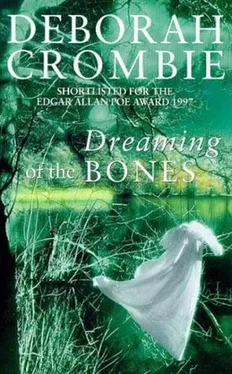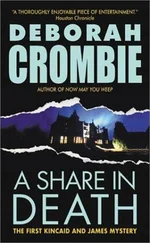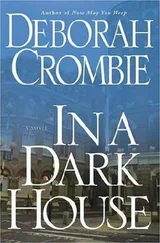Deborah Crombie - Dreaming of the bones
Здесь есть возможность читать онлайн «Deborah Crombie - Dreaming of the bones» весь текст электронной книги совершенно бесплатно (целиком полную версию без сокращений). В некоторых случаях можно слушать аудио, скачать через торрент в формате fb2 и присутствует краткое содержание. Жанр: Детектив, на английском языке. Описание произведения, (предисловие) а так же отзывы посетителей доступны на портале библиотеки ЛибКат.
- Название:Dreaming of the bones
- Автор:
- Жанр:
- Год:неизвестен
- ISBN:нет данных
- Рейтинг книги:3 / 5. Голосов: 1
-
Избранное:Добавить в избранное
- Отзывы:
-
Ваша оценка:
- 60
- 1
- 2
- 3
- 4
- 5
Dreaming of the bones: краткое содержание, описание и аннотация
Предлагаем к чтению аннотацию, описание, краткое содержание или предисловие (зависит от того, что написал сам автор книги «Dreaming of the bones»). Если вы не нашли необходимую информацию о книге — напишите в комментариях, мы постараемся отыскать её.
Edgar Awards (nominee)
Macavity Awards
Dr Victoria McClellan is writing a biography of the tortured poet Lydia Brooke, five years after Brooke's tragic suicide. Victoria becomes immersed in Lydia's life – she cannot believe the poet died by her own hand. So she calls her SI ex-husband for help in the case who receives terrible news…
Dreaming of the bones — читать онлайн бесплатно полную книгу (весь текст) целиком
Ниже представлен текст книги, разбитый по страницам. Система сохранения места последней прочитанной страницы, позволяет с удобством читать онлайн бесплатно книгу «Dreaming of the bones», без необходимости каждый раз заново искать на чём Вы остановились. Поставьте закладку, и сможете в любой момент перейти на страницу, на которой закончили чтение.
Интервал:
Закладка:
“You’re lucky. He’s a nice kid,” said Gemma, knowing even as she did so how inadequate the word sounded, but Vic gave her a pleased smile.
“I know. He doesn’t deserve what he’s been through this last year.” Vic glanced at Kincaid, then back at Gemma. “He’s told you about Ian?”
Gemma nodded. “I’m sorry.”
“Don’t be. At least not for my sake, and I’m beginning to think it may not have been such a bad thing for Kit, either. Ian was so critical… Kit must have felt he could never please him.” For a moment Vic gazed consideringly into her teacup, then looked up at Gemma and said softly, “And you know what’s odd? After so many years together, I’ve never missed him. Not for a day, not for a minute. You’d think that just the familiarity would be enough to make you miss a person a little, no matter what they’d done. Oh, well.” She set her cup on the table and smiled at them. “You didn’t come to talk about that.”
Kincaid shifted beside Gemma as he reached into the inside breast pocket of the sports jacket he’d worn over his jeans. “I’ve brought you the notes I made from Lydia Brooke’s case file. I thought you might like to see them yourself.” He handed over a folded sheaf of papers that Gemma recognized as torn from his spiral notebook. “You understand that I couldn’t take the file away with me.”
Vic took them as though they were fragile, then moved across to the other chair so that she could unfold them in the cone of light from the lamp. She read slowly, frowning in concentration, and they waited in silence. Gemma was suddenly aware of the fire hissing, and of the almost imperceptible sound of the light rain against the windowpanes.
Finally, Vic settled the pages back in their original order, and looked up at them. “Nathan found her?” she said, as if she couldn’t quite believe her own words. “Nathan never told me he found her.”
The strong lamplight lit her face and Gemma saw for the first time the tiny creases round her eyes and the lines running from her nose to the corners of her mouth.
“Should he have done?” asked Kincaid.
Vic colored and looked away. “It’s just that… I thought… we were friends.”
“Maybe he didn’t want to distress you,” suggested Gemma, wishing now that she’d read the notes herself and not been satisfied with Kincaid’s quick summary. “Or he found it too difficult to talk about.”
“Surely there was some other record,” said Kincaid.
“Such as? There were two brief mentions in the local paper, the first stating that Lydia Brooke had been found dead in her Cambridge home; the second that she had died from an overdose of her own heart medication, and that her death had been ruled a suicide by the coroner’s office. Full stop.”
“What about academic gossip?”
“For once, the gossip mill proved strangely unproductive,” Vic said disgustedly. “You’d think that a door had slammed shut when Lydia died-after that, no speculation, no reminiscences, nothing.” Then, as if she could contain her frustration no longer, she stood and began pacing before the hearth. “I wasn’t prepared for this. And it’s not as if I see myself as Quentin Bell writing about Virginia Woolf, either. Lydia wasn’t a major literary figure. Nor was she particularly well connected in literary circles, so I knew I couldn’t hope for scads of revealing letters turning up among other people’s correspondence. But I never expected this… this… possessiveness about her, as if no one who knew her can stand to let anything go. Her ex-husband was actually abusive when I tried to talk to him.
“And this”-she waved the sheaf of papers she still held-“this is all wrong.”
“What do you mean, wrong?” Kincaid asked, and in spite of his casual tone Gemma sensed his interest.
Coming back to sit on the edge of the armchair, Vic leaned towards them. “Nathan, for one thing. Why did Lydia call Nathan and tell him she wanted to see him?”
“I imagine they assumed she wanted him to find her rather than the cleaning lady or some unfortunate neighbor,” Kincaid offered.
“She would never have done that, don’t you see? Not to Nathan. They were very old friends, and he’d just lost his wife a few months earlier after a long battle with cancer. She wouldn’t have deliberately subjected him to such distress.”
“Sometimes when people are depressed they do un-”
Vic was shaking her head adamantly. “And what about her clothes? Lydia had style, damnit-you can’t possibly think she’d have set such an elaborate scene, then killed herself in old, grubby things?”
“I have to admit it seemed a bit queer to me,” Kincaid said cautiously. “But sometimes-”
“And the business about the poem is absurd,” Vic went on, unheeding. She started rifling through the pages. “Let me just-”
“Why?” The sharpness in his voice made Vic look up, hands stilled for a moment on the pages. “Why is it absurd?” he repeated.
“Because she didn’t write it,” Vic said flatly. “It’s an excerpt from a Rupert Brooke poem called ‘Choriambics.’”
“Could I see it?” asked Gemma. She took the page from Vic’s outstretched hand, and when she found they were both watching her, she began to read aloud slowly.
In the silence of death; then may I see dimly, and
know, a space ,
Bending over me, last light in the dark, once, as of
old, your face .
Gemma looked up. “It does seem fitting, especially if she’d lost a great love.”
“And if she was obsessed with Rupert Brooke, what could have been more appropriate than to use one of his poems as her final message?” said Kincaid.
“Rather than her own voice?” Vic shook her head and took a breath, a calming effort. “Lydia was a poet first. That’s what made her who she was. That’s why I wanted to write about her. Women need those kinds of models-we need to hear the stories of women who have lived out their dreams, regardless of the cost. That way maybe we can get there, too, and without so much suffering along the way.”
“Then why would she have had an excerpt from a Brooke poem in her typewriter if it wasn’t meant for a suicide note?” Kincaid asked, raising a skeptical brow.
“I haven’t a clue. All I can tell you is that she would never have used someone else’s words.” Vic rubbed at her face, then said through splayed fingers, “Oh, how can I make you understand? Words were everything to her-her joy, her sorrow, her comfort. She would not have abandoned them in the final extreme. It would have been a betrayal beyond measure.”
The fire popped, and in the silence that followed, Gemma said, “I do. Understand, I mean. I think I understand what you’re saying.”
“You don’t think I’m daft?”
“No. Even if I don’t know much about poetry, I understand about not giving up who you are.”
Vic turned to Kincaid. “And have I convinced you?”
After a long moment he said a bit grudgingly, “Yes, I suppose so. But I still don’t see how-”
“There’s more,” Vic said. “Since I saw you last. Last week Nathan gave me a book he found among Lydia’s things, Edward Marsh’s memoir of Rupert Brooke. It was published in 1919, and included the first posthumous collection of Brooke’s poems. It was one of Lydia’s treasures-she found it in a secondhand bookshop her first year at Cambridge.
“I put it in the stack on my bedside table”-she flashed a smile at Kincaid, and Gemma wondered if Vic’s habit of taking books to bed had been a point of contention between them-“but it wasn’t until last night that I settled down to have a good look at it. You can’t imagine how I felt when I leafed through it and the manuscript pages fell out.” Vic smiled as if even the memory were delicious.
Читать дальшеИнтервал:
Закладка:
Похожие книги на «Dreaming of the bones»
Представляем Вашему вниманию похожие книги на «Dreaming of the bones» списком для выбора. Мы отобрали схожую по названию и смыслу литературу в надежде предоставить читателям больше вариантов отыскать новые, интересные, ещё непрочитанные произведения.
Обсуждение, отзывы о книге «Dreaming of the bones» и просто собственные мнения читателей. Оставьте ваши комментарии, напишите, что Вы думаете о произведении, его смысле или главных героях. Укажите что конкретно понравилось, а что нет, и почему Вы так считаете.












